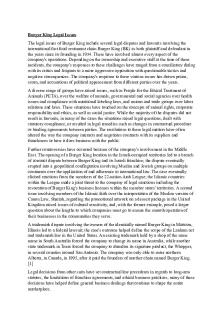Legal Brief Chapter 7 Maryland v. King PDF

| Title | Legal Brief Chapter 7 Maryland v. King |
|---|---|
| Author | Athena Childers |
| Course | Law of Criminal Procedure |
| Institution | Saint Leo University |
| Pages | 2 |
| File Size | 78.7 KB |
| File Type | |
| Total Downloads | 19 |
| Total Views | 146 |
Summary
Download Legal Brief Chapter 7 Maryland v. King PDF
Description
CRM 322 Law of Criminal Procedure
Student Name: Athena Childers
Date: 09 March 2017 Legal Brief
1. Title and Citation: Maryland v. King, 133 S.Ct. 1958 (2013) 2. Type of action: Fourth Amendment violation, specifically the seizure of DNA or bodily fluids without a search warrant or permission from the individual. 3. Facts: Alonzo Jay King Jr. was arrested for first and second degree assault. As according to Maryland police protocol, the Maryland DNA Collection Act, a DNA sample was taken from King at the time of the arrest and entered into Maryland's database. It was matched to an unsolved rape case in 2003. A Maryland officer presented the evidence to a Wicomico County grand jury, which called for an indictment, procured a warrant to obtain a second buccal DNA sample that could be used as incriminating evidence for the 2003 rape case. King filed a motion to suppress the DNA evidence, stating that it infringed upon his Fourth Amendment rights, which prohibit unreasonable searches and seizure. 4. Issue(s): Does the Fourth Amendment allow states to collect and analyze DNA from individuals arrested of sex crimes? Yes, under the Fourth Amendment, states have the right to collect DNA from individuals arrested. 5. History/Decision: King filed a motion to suppress the DNA evidence in the Circuit Court of Wicomico County. His motion was DENIED, and King was CONVICTED of first degree rape. The Maryland Court of Appeals then REVERSED the original ruling. The State of Maryland then APPEALED to the Supreme Court of the United States and the Supreme Court of the
United States GRANTED CERTIORARI and REVERSED the judgment of the Maryland Court of Appeals. 6. Reasoning: Conducting a DNA swab test as a part of the arrest procedure does not violate the Fourth Amendment because the test serves a legitimate state interest and is not so invasive so as to require a warrant. The routine administrative procedures that occur during a booking for an arrest do not require the same justification and the search of a location. 7 Rule of Law: The Supreme Court held that determining an arrestee's identity and criminal history is a crucial part of the arrest procedure and that a DNA test is just as valid and informative as fingerprinting. Determining an arrestee's criminal history serves the legitimate state interest of determining what level of risk the individual poses to the public and what conditions should be set on his/her release from custody....
Similar Free PDFs

Maryland v King - case brief
- 2 Pages

Brief mcculloch v maryland
- 2 Pages

Mcculloch v maryland brief
- 1 Pages

Burger King Legal Issues
- 1 Pages

Maryland v. Buie Lecture Notes
- 2 Pages

Brief Singleton v Wulff
- 4 Pages

Howard v. Kuntos Brief
- 1 Pages
Popular Institutions
- Tinajero National High School - Annex
- Politeknik Caltex Riau
- Yokohama City University
- SGT University
- University of Al-Qadisiyah
- Divine Word College of Vigan
- Techniek College Rotterdam
- Universidade de Santiago
- Universiti Teknologi MARA Cawangan Johor Kampus Pasir Gudang
- Poltekkes Kemenkes Yogyakarta
- Baguio City National High School
- Colegio san marcos
- preparatoria uno
- Centro de Bachillerato Tecnológico Industrial y de Servicios No. 107
- Dalian Maritime University
- Quang Trung Secondary School
- Colegio Tecnológico en Informática
- Corporación Regional de Educación Superior
- Grupo CEDVA
- Dar Al Uloom University
- Centro de Estudios Preuniversitarios de la Universidad Nacional de Ingeniería
- 上智大学
- Aakash International School, Nuna Majara
- San Felipe Neri Catholic School
- Kang Chiao International School - New Taipei City
- Misamis Occidental National High School
- Institución Educativa Escuela Normal Juan Ladrilleros
- Kolehiyo ng Pantukan
- Batanes State College
- Instituto Continental
- Sekolah Menengah Kejuruan Kesehatan Kaltara (Tarakan)
- Colegio de La Inmaculada Concepcion - Cebu








